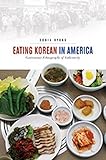Eating Korean in America : Gastronomic Ethnography of Authenticity / Sonia Ryang; ed. by Robert Ji-Song Ku, Christine R. Yano.
Material type: TextSeries: Food in Asia and the PacificPublisher: Honolulu : University of Hawaii Press, [2015]Copyright date: ©2015Description: 1 online resource (208 p.) : 12 color illustrationsContent type:
TextSeries: Food in Asia and the PacificPublisher: Honolulu : University of Hawaii Press, [2015]Copyright date: ©2015Description: 1 online resource (208 p.) : 12 color illustrationsContent type: - 9780824839352
- 9780824854911
- 641.59519 23
- online - DeGruyter
- Issued also in print.
| Item type | Current library | Call number | URL | Status | Notes | Barcode | |
|---|---|---|---|---|---|---|---|
 eBook
eBook
|
Biblioteca "Angelicum" Pont. Univ. S.Tommaso d'Aquino Nuvola online | online - DeGruyter (Browse shelf(Opens below)) | Online access | Not for loan (Accesso limitato) | Accesso per gli utenti autorizzati / Access for authorized users | (dgr)9780824854911 |
Browsing Biblioteca "Angelicum" Pont. Univ. S.Tommaso d'Aquino shelves, Shelving location: Nuvola online Close shelf browser (Hides shelf browser)

|

|

|

|

|

|

|
||
| online - DeGruyter The Pearl Frontier : Indonesian Labor and Indigenous Encounters in Australia's Northern Trading Network / | online - DeGruyter Sea of Opportunity : The Japanese Pioneers of the Fishing Industry in Hawaii / | online - DeGruyter The Immortals : Faces of the Incredible in Buddhist Burma / | online - DeGruyter Eating Korean in America : Gastronomic Ethnography of Authenticity / | online - DeGruyter Javaphilia : American Love Affairs with Javanese Music and Dance / | online - DeGruyter Imagining Exile in Heian Japan : Banishment in Law, Literature, and Cult / | online - DeGruyter Holy Ghosts : The Christian Century in Modern Japanese Fiction / |
Frontmatter -- Contents -- Acknowledgments -- Introduction -- 1. A Global Slurp -- 2. Food for the Ancestors -- 3. Two Colonizations and Three Migrations -- 4. A Taste of Diversity -- Conclusion -- References -- Index -- About the Author
restricted access online access with authorization star
http://purl.org/coar/access_right/c_16ec
Can food be both national and global at the same time? What happens when a food with a national identity travels beyond the boundaries of a nation? What makes a food authentically national and yet American or broader global? With these questions in mind, Sonia Ryang explores the world of Korean food in four American locations, Iowa City, Baltimore, Los Angeles, and Hawaii (Kona and Honolulu). Ryang visits restaurants and grocery stores in each location and observes Korean food as it is prepared and served to customers. She analyzes the history and evolution of each dish, how it arrived and what it became, but above all, she tastes and experiences her food-four items to be specific-naengmyeon cold noodle soup; jeon pancakes; galbi barbecued beef; and bibimbap, rice with mixed vegetable. In her ethnographic journey, Ryang discovers how the chewy noodles from Pyongyang continue to retain their texture and yet are served differently in different locales. Jeon pancakes become completely decontextualized in the United States and metamorphosed into a portable and packable carry-out food. American consumers are unaware of the pancake's sacred origin. In Hawaii, Ryang finds that it is the Vietnamese restaurant that serves unexpectedly delicious galbi barbecued meat. Intertwined in the complex colonial and postcolonial contexts, Korean galbi and Japanese yakiniku can be found side by side on the streets of Honolulu frequented by both the locals and tourists. In writing Eating Korean in America: Gastronomic Ethnography of Authenticity, Sonia Ryang is as much an eater as a researcher. Her accounts of the cities and their distinctive take on Korean food are at once entertaining and insightful, yet deeply moving. Ryang challenges the reader to stop and think about the food we eat every day in close connection to colonial histories, ethnic displacements, and global capitalism.
Issued also in print.
Mode of access: Internet via World Wide Web.
In English.
Description based on online resource; title from PDF title page (publisher's Web site, viewed 02. Mrz 2022)


